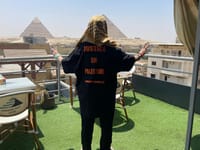The Global March To Gaza was an unprecedented movement in the history of humanity, initiated from more than 50 countries across the world!
June 12, 2025, was a historic date. More than 4,000 people from around the world gathered in Cairo for an unprecedented act of solidarity with the Palestinian people. The goal: to march toward Gaza and reach Rafah, the border point between Egypt and Palestine, in order to break the blockade of Gaza and demand the opening of a corridor to allow humanitarian aid trucks to pass through. Since March 2025, Israel has been using famine as a weapon of war in the genocide unfolding before our eyes for more than 20 months—a famine that has already claimed the lives of many children and threatens hundreds of thousands more. This action took place in parallel with that of the Freedom Flotilla. Aboard the Flotilla were, notably, Swedish activist Greta Thunberg, known for her environmental advocacy, and Rima Hassan, a Member of the European Parliament of Palestinian origin whose family was expelled from its land in 1948. Their goal was exactly the same as that of the people of the world who rose up and organized to do what governments refuse to do.
My name is Meriem, and I have been campaigning for justice for the Palestinian people since the beginning of the genocide. As part of a grassroots collective, I demonstrate every weekend to amplify the voices of those whom others would silence. I engage in boycott campaigns and public awareness efforts to help people understand the atrocities Palestinians have endured for over 76 years, in the total indifference of the international community. To support my activism, I joined The France Unbowed—the only political party that has been on the right side of history from the beginning. Firmly believing in the power of popular pressure, my participation in the Global March To Gaza was self-evident. This is what I experienced.
On my way to the airport on June 11, the day of my departure, I received a call from a friend active in a humanitarian organization. She informed me of police crackdowns and the violence being inflicted on marchers. The president of her organization had joined the movement but had decided to leave for Egypt two days earlier to get his bearings. He was violently apprehended and arrested in his hotel room in the early hours of June 10 at 3:00 AM. He was immediately sent to the airport, then placed in detention in what the Egyptian authorities call a “quarantine space,” without food or water for more than 24 hours, before being loaded into a police van and put on a flight back to France. This was the treatment all marchers received that night. Despite my friend’s warnings, I decided to continue and boarded my flight to Cairo.
Before arriving in Egypt, my two comrades—whom I will call Anna and Isobel—and I had a 7.5-hour layover at Istanbul Airport, where our delegation leader texted us, ordering us to abandon our hotel, which was now under police surveillance. Fortunately, Anna’s brother—whom I will call Farouk—lives in Cairo, and we were able to take refuge at his home. I am especially grateful to him for sharing the risks with us, sometimes despite himself.
I arrived in Cairo during the night of June 11–12 at 2:00 AM. The airport was crowded. At the very first checkpoint, my passport was confiscated. Customs officers ordered me to wait with my comrades and the rest of our flight group in one of those infamous “quarantine spaces.” I refused and decided to remain in the middle of the airport with the others. Looking around at the passengers from my flight, I realized that we were all marchers, but I forced myself to play the tourist. Suddenly, I heard Arabic slogans in the distance denouncing the ongoing genocide in Gaza and praising the courage and bravery of the Palestinian people. I understood that some marchers had been identified. I felt tears welling up. I didn’t know then what would happen to us, but my heart longed to join their protest, which echoed throughout the airport and moved many of us.
An hour passed, and still no passport was returned. We pretended not to understand why we were being singled out and left waiting without explanation. One question was asked repeatedly when we questioned the authorities: What is your origin? We indeed noticed differential treatment: Western passengers were getting their passports back more quickly than those of Arab descent.
After 2.5 hours of stress, fatigue, and anxiety at the prospect of being deported to France, our passports were finally returned.
But the ordeal didn’t end there. At the final checkpoint, five internal security agents stopped us. Our bags were thoroughly searched, and the questioning turned into harassment once they found sleeping bags and hiking gear hidden in our suitcases. Our only hope at that point was Farouk, Anna’s well-connected brother. He has lived in Cairo for several years with his wife and children and holds a high-ranking government job closely tied to the Sisi regime. Thanks to him and his connections, we were able to leave the airport, though at that moment he had no idea what risks we would soon share.
The June 13th Meeting
We had planned to meet in front of the Niles X Hotel, near the Cairo Tower downtown, to board a bus chartered for the marchers at 6:30 AM on June 13. The goal was to reach Al Arish, the capital of the Egyptian governorate of North Sinai—now a beach resort of over 144,900 inhabitants and located 50 km from Rafah. That’s where the march was to begin. The rendezvous was canceled due to the police presence in and around the hotels. We now had to reach Ismailia on our own—a city 116 km from New Cairo (where we were staying), and 200 km south of Al Arish. The new departure time was set for noon.
Since we were staying at Farouk’s, he attempted to drive us there. “Attempted” is the right word: at the tollbooth of the El Shorouk City highway, 52 km from New Cairo, a heavily armed police roadblock awaited us. We were stopped directly in front of a police car blocking the road. One officer approached the vehicle and asked for Anna’s and Farouk’s identification. To this day, I still don’t know how he didn’t see Isobel and me sitting in the back seat. Upon seeing Anna’s foreign passport, he immediately ordered her out of the vehicle and to follow him, then told her to return to collect her belongings. We had hidden our hiking gear, allowing her to take only her personal items and blend in with the crowd. As the scorching hours passed, I saw more and more Ubers and taxis being stopped and their passengers taken by police. I stayed hidden to avoid causing serious trouble for Farouk, who was leveraging his connections to get us out.
Five hours. Five hours hidden in the back of a car under the sun, without water or air conditioning. From my tinted window, I watched with immense frustration, unable to join the marchers of all ages and backgrounds, united in solidarity, huddled under the gas station awning in the blazing sun, also without food or water. Buses were brought in to forcibly transport them, and I admired their resistance to repression and injustice. Eventually, when the barriers were lifted, we took the opportunity to escape the traffic jam and seek safety.
We still didn’t know what would happen to the others, including Anna. But we were certain of one thing: we had to get home quickly and empty our bags full of Palestinian products before a potential police raid. On the way, we saw army trucks parked and ready to intervene in case of a popular uprising. I was deeply worried for everyone.
Thanks to his cooperation, Anna was dropped off near New Cairo, where her brother picked her up. We later learned that the other marchers arrested at El Shorouk were also sent back to Cairo. However, those who managed to reach Ismailia faced shameful repression and hardship. They were allowed to pass two checkpoints, but at the third, they were beaten by the police and a militia called the Bateldjia, which made no distinction between men and women as they struck peaceful, unarmed marchers with batons. We also learned that some delegates—including Swiss members like Dr. Hicham El Ghaoui and his wife, as well as Manuel Tapial of the Canadian delegation—were arrested, detained for 72 hours, then expelled from the country. Nelson Mandela’s grandson had his passport confiscated.
The Witch Hunt
None of us was safe in Egypt anymore. Hotel staff were ordered to report all foreigners. Violent arrests continued until our return to France on June 18. We later learned that Mossad was involved in the arrests and interrogations.
For security reasons, my comrades and I left Cairo. We booked a hotel for our last four days in a tourist area—Giza, at the foot of the pyramids—to blend in and reconnect with other marchers. I found one, Imany. At first, we were wary of one another; the pressure of surveillance was intense. Sometimes, we even felt like we were being followed. We later learned this was not just a feeling. Imany was frequently questioned by a man who claimed his car had broken down and that he had to temporarily stay at her hotel. She would also spot him at places she visited. On the day she left for the airport, she confirmed his true intentions. He had always claimed he was waiting for his car to be repaired to leave the hotel—yet he left the same day she did. Where was the car?
There was no longer any hope that the march could take place. But that didn’t stop us from continuing our protest in our own way until we returned to French soil. There wasn’t a single tourist site where we didn’t raise the Palestinian flag and keffiyeh, and we boarded our flight to the sound of “Palestine,” to the great dismay of the lone Zionist on the plane!
How can one explain the Egyptian government’s position, and why so much violence toward peaceful supporters of the Palestinian people?
It’s important to note that the Global March To Gaza was not a rogue operation. Each representative of the 50 countries involved in the movement approached the Egyptian government to obtain the necessary authorizations. While every Egyptian embassy gave clear support to the march, the Egyptian government neither endorsed nor opposed it. For over two months, marchers sent emails and registered letters to the relevant authorities, but not a single concrete response came from the Sisi regime!
There is no justification for the violence inflicted on the marchers, who had been granted visas to enter Egyptian territory. Egypt knew everything and cannot pretend otherwise, having ignored the many formal requests for authorization to march to Rafah. We know that Netanyahu personally pressured Egypt to block our passage. So why this submission to a genocidal state?
One must understand that Egyptian tourism is in decline. The country produces nothing and survives only through its trade relationships, particularly with Israel. It is purely for economic reasons that the Egyptian government complies with Netanyahu’s demands—allowing the Palestinian people, our brothers and sisters, to die.
The march of June 12 was only the first chapter in the story of the Global March To Gaza. This week, from June 20 to 29, marchers were called to gather in Brussels. Once again, thousands traveled to raise the alarm about the ongoing genocide in Gaza, confronting all heads of state gathered on June 25–26 for the European Council.
The struggle continues.
There will be no peace in the world without justice in Palestine.
As long as Palestine is not free, neither are we.
This struggle is a struggle for all of humanity.
Free Palestine.








